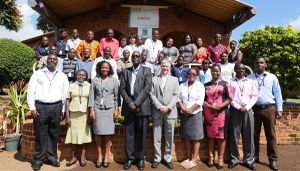Malawi, a landlocked country in sub-Saharan Africa, faces the challenge of one of the highest population densities in the region. With an estimated population surpassing 20 million as of 2022 and projected to exceed 50 million people by 2058, the nation has been actively implementing significant economic and structural reforms to stimulate growth. Despite its current status as one of the world's poorest nations, there is a positive trajectory towards a more prosperous future.
Agriculture holds a central position in the Malawian economy, acting as the backbone of livelihoods for nearly 80% of the population. While the heavy reliance on agriculture makes the economy susceptible to external shocks, especially those related to climate change, there is optimism and resilience within Malawi's farming communities. Despite challenges such as erratic rainfall patterns, prolonged droughts, and extreme weather events, the importance of agriculture in driving economic growth and rural development remains significant.

In January 2021, the government took a significant stride forward by launching the Malawi Vision 2063, an ambitious roadmap with the goal of transforming the nation into a wealthy and self-reliant industrialized upper-middle-income country. As Malawi endeavors to realize this vision, the emphasis on agriculture and its potential to contribute to economic growth and rural development becomes even more pronounced.
Currently, agriculture contributes approximately 20% to Malawi's Gross Domestic Product (GDP) and employs around 80% of the country's workforce. While there are critical issues such as a devalued currency and escalating production costs, addressing these concerns is seen as an opportunity to bolster agricultural productivity and enhance the welfare of farming communities.
Highlighting the importance of dryland agriculture in Malawi is crucial, especially given the reliance on rainfed farming in many regions. To ensure food security, sustainable economic growth, and poverty alleviation, there is a pressing need to develop innovative and climate-resilient farming practices. Investments in agricultural research, improved access to quality inputs, and the adoption of climate-smart technologies are imperative to unlock the full potential of Malawi's agricultural sector.
ICRISAT recognizes the significance of dryland agriculture in Malawi and is dedicated to collaborating with the government, local communities, and partners to address these challenges. By promoting sustainable farming practices, enhancing crop productivity, and building resilience against climate variability, the goal is to support Malawi's journey towards a prosperous and self-sufficient future, where agriculture serves as a catalyst for economic growth and prosperity for all.
ICRISAT-Malawi, established in 1985 with a primary focus on groundnut improvement, continues to play a pivotal role in advancing agricultural productivity and commercialization in line with the country's ambitious Malawi Vision 2063. This vision aims to drive agricultural growth, industrialization, and urbanization to create a prosperous and self-reliant nation. ICRISAT's efforts are well-aligned with key national strategies, including the National Multi-Sector Nutrition Strategic Plan 2018-2023, which targets the improvement of nutrition and health, as well as the National Agriculture Policy and National Agriculture Investment Plan 2018-2023, focusing on sustainable agricultural production and food security.
Our country office in Malawi is well-equipped to support our research and development endeavors. With access to both irrigated and non-irrigated land in Chitedze and LUANAR, our facilities include crop protection labs, genomics and plant physiology labs, seed testing labs, nutrition labs, mid-term storage cold rooms, a warehouse with an 800 MT capacity, and 17 glasshouses. These resources enable us to conduct cutting-edge research, develop improved varieties, and foster sustainable agricultural practices.
Over the years, ICRISAT's work in Malawi has made significant strides in enhancing agricultural production, productivity, and ecosystem resilience. Through the promotion of legumes and the adoption of improved technologies, we have contributed to reducing production costs and increasing crop yields. Notably, we released improved varieties of chickpea, finger millet, and drought-tolerant groundnut in 2021, marking substantial advancements in agricultural innovation in Malawi.

Our commitment to improving nutrition and food safety is evident through our interventions in formal and informal markets, raising awareness on aflatoxin contamination hazards, and advocating for standardized products. ICRISAT's inclusive value chain approaches have strengthened input and output markets, fostering farm income diversification and improved nutrition for communities.
Building on our successes, ICRISAT continues to invest in capacity development for partners, empowering them to accelerate research impacts and drive sustainable development. Looking ahead, we are committed to modernizing breeding, enhancing crop protection and soil health, and implementing aflatoxin mitigation strategies. Additionally, our future endeavors will prioritize capacity development initiatives tailored to women and youth, empowering them as key stakeholders in driving agricultural transformation in Malawi.
Through collaboration with the government, local communities, and other stakeholders, ICRISAT remains steadfast in its mission to support Malawi's agricultural development, enhance food security, and create resilient farming systems that benefit all.
or scan the QR 

Sorghum

Pearl Millet

Chickpea

Pigeonpea

Groundnut

Finger Millet

ICRISAT - Malawi Lilongwe
Phone: +265 1 707 297/071/067/057
Fax: +265 1 707 298
Email: icrisat-mwi@icrisat.org
Address: Chitedze Agricultural Research Station, PO Box 1096, Lilongwe, Malawi
15 Jan 2025